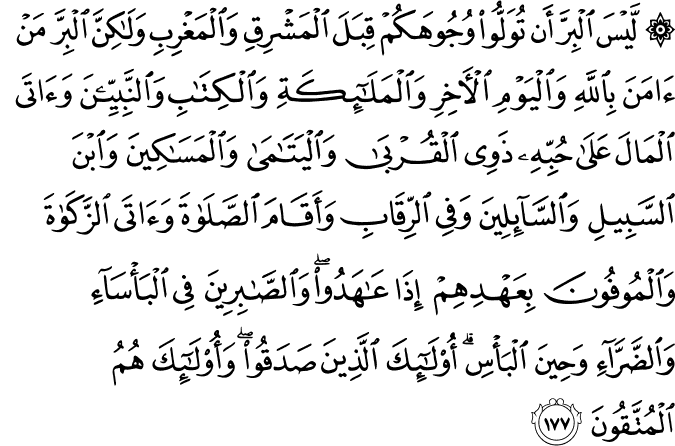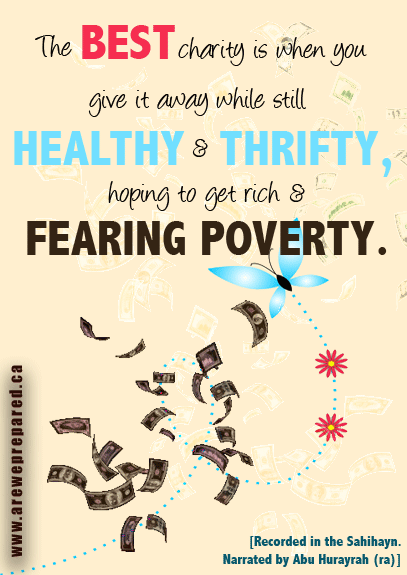Posted by Umm Sahl in Quran Reminders | 0 Comments
Al-Birr (Piety, Righteousness)

It is not Birr that you turn your faces towards east and (or) west; but Birr is the one who believes in Allah, the Last Day, the Angels, the Book, the Prophets and gives his wealth, in spite of love for it, to the kinsfolk, to the orphans, and to Al-Masakin (the poor), and to the wayfarer, and to those who ask, and to set servants free, performs As-Salah (Iqamat-As-Salah), and gives the Zakah, and who fulfill their covenant when they make it, and who are patient in extreme poverty and ailment (disease) and at the time of fighting (during the battles). Such are the people of the truth and they are Al-Muttaqun (the pious).(2:177)
Tafsir (Ibn Kathir)
 Al-Birr (Piety, Righteousness)
Al-Birr (Piety, Righteousness)
This Ayah contains many great wisdoms, encompassing rulings and correct beliefs.
As for the explanation of this Ayah, Allah first commanded the believers to face Bayt Al-Maqdis, and then to face the Ka`bah during the prayer. This change was difficult for some of the People of the Book, and even for some Muslims. Then Allah sent revelation which clarified the wisdom behind this command, that is, obedience to Allah, adhering to His commands, facing wherever He commands facing, and implementing whatever He legislates, that is the objective. This is Birr, Taqwa and complete faith. Facing the east or the west does not necessitate righteousness or obedience, unless it is legislated by Allah. This is why Allah said:
(It is not Birr that you turn your faces towards east and (or) west (in prayers); but Birr is the one who believes in Allah and the Last Day,)
Similarly, Allah said about the sacrifices:
It is neither their meat nor their blood that reaches Allah, but it is the piety from you that reaches Him. (22:37)
The `Books’ are the Divinely revealed Books from Allah to the Prophets, which were finalized by the most honorable Book (the Qur’an). The Qur’an supercedes all previous Books, it mentions all types of righteousness, and the way to happiness in this life and the Hereafter. The Qur’an abrogates all previous Books and testifies to all of Allah’s Prophets, from the first Prophet to the Final Prophet, Muhammad, may Allah’s peace and blessings be upon them all.
Allah’s statement:
(…and gives his wealth, in spite of love for it,) refers to those who give money away while desiring it and loving it. It is recorded in the Sahihayn that Abu Hurayrah narrated that the Prophet said:
The best charity is when you give it away while still healthy and thrifty, hoping to get rich and fearing poverty.
Allah said:
And they give food, inspite of their love for it, to the Miskin (the poor), the orphan, and the captive (saying): “We feed you seeking Allah’s Face only. We wish for no reward, nor thanks from you.” (76:8, 9)
and:
By no means shall you attain Birr unless you spend of that which you love. (3:92) Allah’s statement:
…and give them preference over themselves even though they were in need of that (59:9) refers to a higher category and status, as the people mentioned here give away what they need, while those mentioned in the previous Ayat give away what they covet (but not necessarily need).
Allah’s statement:
(the kinsfolk) refers to man’s relatives, who have more rights than anyone else to one’s charity, as the Hadith supports:
Sadaqah (i. e., charity) given to the poor is a charity, while the Sadaqah given to the relatives is both Sadaqah and Silah (nurturing relations), for they are the most deserving of you and your kindness and charity.
Allah has commanded kindness to the relatives in many places in the Qur’an.
(to the orphans) The orphans are children who have none to look after them, having lost their fathers while they are still young, weak and unable to find their own sustenance since they have notreached the age of work and adolescence.
(and to Al-Masakin) The Miskin is the person who does not have enough food, clothing, or he has no dwelling. So the Miskin should be granted the provisions to sustain him enough so that he can acquire his needs.
(and to the wayfarer) is the needy traveler who runs out of money and should, thus, be granted whatever amount that helps him to go back to his land. Such is the case with whoever intends to go on a permissible journey, he is given what he needs for his journey and back. The guests are included in this category.
(and to those who ask) refers to those who beg people and are thus given a part of the Zakah and general charity.
(and to set servants free) These are the servants who seek to free themselves, but cannot find enough money to buy their freedom.
Allah’s statement:
(performs As-Salah (Iqamat-As-Salah)) means those who pray on time and give the prayer its due right; the bowing, prostration, and the necessary attention and humbleness required by Allah.
Allah’s statement:
(and gives the Zakah) means the required charity
Allah’s statement:
(and who fulfill their covenant when they make it,)
Allah’s statement:
(. ..and who are patient in extreme poverty and ailment (disease) and at the time of fighting (during the battles). means, during the time of meekness and ailment.
(…and at the time of fighting (during the battles) means on the battlefield while facing the enemy
And calling them the patient here, is a form of praise, because of the importance of patience in these circumstances, and the suffering and difficulties that accompany them. And Allah knows best, it is He Whom help is sought from, and upon Him we rely.
Allah’s statement:
(Such are the people of the truth) means, whoever acquires these qualities, these are truthful in their faith. This is because they have achieved faith in the heart and realized it in deed and upon the tongue. So they are the truthful,
(and they are Al-Muttaqun (the pious) because they avoided the prohibitions and performed the acts of obedience.

 Umm Sahl, your sister in Islam, a wife and mother of 3 beautiful blessed babies
Umm Sahl, your sister in Islam, a wife and mother of 3 beautiful blessed babies